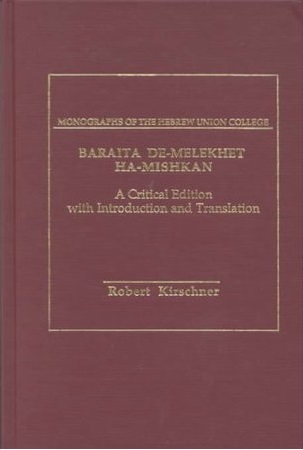Robert Kirschner
Monographs of the Hebrew Union College 15
The description of the wilderness Tabernacle (melekhet ha-mishkan) in Exodus exerted a lasting impact on ancient Jewish culture, evidenced by other texts influenced by its description in Exodus: the description of Solomon’s temple (I Kings 6–7), the sanctuary described in the Temple Scroll (cols. 3–13), the Eupolemus fragments, and Josephus.
Philo of Alexandria first interprets the Tabernacle account in the Greek tradition of allegory wherein the tabernacle represents an archetype of the universe, that physical entity most approximating the divine abode. Apocalyptic literature frequently presents a celestial sanctuary, but the Temple rather than the Tabernacle is often the paradigm. Origen represents a typical patristic view where the tabernacle description is read completely figuratively.
Tannaitic, amoraic, and geonic literature, on the other hand, provides scattered remarks on and explanations of biblical passages but no sustained exegesis of the tabernacle description. Baraita de-Melekhet ha-Mishkan presents the only systematic rabbinic exegesis of the tabernacle account to come from late antiquity or the Middle Ages. In contrast to Philo, the Church fathers, and the aggadic midrashim, this baraita assumes that the tabernacle and its furnishings need explanation as historical objects. The technology of construction, the calculation of measurements, and the delineation of architectural forms concern the framers of this document.
Kirschner provides 150 pages of introductory analysis on this document’s genre, structure, language, origin, date, and textual criticism before providing a critical edition with apparatus. Following the critical edition can be found Kirschner’s English translation, Genizah transcriptions, plates, an appendix of biblical citations within the baraita and one for biblical and postbiblical sources in general, bibliography, and general index.
A masterpiece of erudition and exactitude. – Justice Haim H. Cohn

